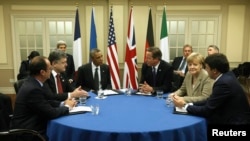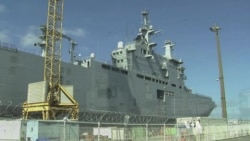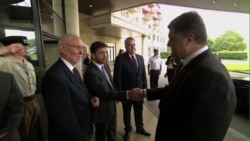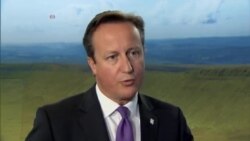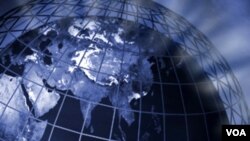ບັນດາຜູ້ນຳອົງການ NATO ຊຶ່ງພົບປະກັນເປັນມື້ທີສອງ ໃນ
ກອງປະຊຸມສຸດຍອດ ຢູ່ແຄວ້ນ Wales ຂອງອັງກິດ ໃນວັນສຸກ
ມື້ນີ້ ກຳລັງພິຈາລະນາການລົງໂທດເພີ້ມຂື້ນຕໍ່ຣັດເຊຍ ກ່ຽວກັບ
ການທີ່ເຫັນຢ່າງກວ້າງຂວາງວ່າ ເປັນການ ໃຫ້ຄວາມສະໜັບ
ສະໜຸນແກ່ພວກແບ່ງແຍກດິນແດນໃນພາກຕາເວັນອອກຂອງ
ຢູເຄຣນນັ້ນ.
ນອກນັ້ນແລ້ວ ຍັງເປັນທີ່ຄາກັນວ່າ ກຸ່ມພັນທະມິດ NATO ທີ່ມີ
ສະມາຊິກ 28 ປະເທດ ຈະໃຫ້ການອະນຸມັດຕໍ່ການສ້າງຕັ້ງກອງ
ກຳລັງຕອບໂຕ້ຢ່າງວ່ອງໄວ ແລະການສົ່ງອຸບປະກອນ ທາງທະ
ຫານໄປຍັງຢູໂຣບຕາເວັນອອກເພື່ອຊ່ວຍສະກັດກັ້ນຕໍ່ການຮຸກ
ຮານທາງທະຫານ ທີ່ອາດ ມີຂຶ້ນຂອງຣັດເຊຍ ຢູ່ທີ່ນັ້ນ.
ນາຍົກລັດຖະມົນຕີອັງກິດ ທ່ານ David Cameron ປະກາດໃນວັນສຸກມື້ນີ້ວ່າ ປະເທດ
ຂອງທ່ານຈະສົມທົບກຳລັງທະຫານ 3,500 ຄົນ ເຂົ້າໃນກຳລັງຕອບໂຕ້ຢ່າງວ່ອງໄວໂດຍ
ກ່າວວ່າ ອົງການ NATO ຕ້ອງເພີ້ມສະມັດຖະພາບ ເພື່ອຮັບມືກັບການທ້າທາຍຕ່າງໆໃນ
ຢູໂຣບ.
ທ່ານ Cameron ໄດ້ໃຫ້ຄວາມເຫັນດັ່ງກ່າວ ຫລັງຈາກພົບປະກັບບັນດາຜູ້ນຳ ສະຫະ
ລັດ ຮວມທັງ ປະທານາທິບໍດີ Barack Obama ຜູ້ທີ່ມີກຳນົດຈະກ່າວ ຖະແຫລງ ໃນ
ຕອນທ້າຍຂອງກອງປະຊຸມສຸດຍອດນີ້.
ກ່ອນໜ້ານີ້ ລັດຖະມົນຕີຕ່າງປະເທດອັງກິດ ທ່ານ Phillip Hammond ກ່າວວ່າ ປະເທດ
ຕາເວັນຕົກມີແຜນການຈະດຳເນີນການຕໍ່ໄປໃນການລົງໂທດຕໍ່ຣັດ ເຊຍ ແຕ່ກໍກ່າວວ່າ
ເຂົາເຈົ້າອາດຈະຍົກເລີກກໍໄດ້ ສຸດແລ້ວແຕ່ຜົນຂອງການເຈ ລະຈາສັນຕິພາບ ໃນວັນສຸກ
ມື້ນີ້ ທີ່ອາດຈະພາໃຫ້ມີການຢຸດຍິງນັ້ນ.
ວິດກິດການໃນຢູເຄຣນ ໄດ້ຄອບງຳການເຈລະຈາຫາລື ແຕ່ບັນດາຜູ້ນຳຂອງອົງການ
NATO ຍັງໄດ້ຫາລືກັນ ກ່ຽວກັບການພັດທະນາຍຸດທະສາດເພື່ອຄວບຄຸມ ໄພຂົ່ມຂູ່
ຈາກພວກຫົວຮຸນແຮງລັດອິສລາມ ຊຶ່ງໃນບໍ່ເທົ່າໃດອາທິດທີ່ຜ່ານມາໄດ້ ເຂົ້າຍຶດເອົາ
ພື້ນທີ່ອັນກວ້າງຂວາງ ໃນພາກເໜືອຂອງອີຣັກ ແລະພາກຕາເວັນອອກຂອງຊີິເຣຍ.
NATO leaders meeting for a second day at a summit in Wales on Friday are considering more sanctions against Russia over its widely perceived support for separatists in eastern Ukraine.
The 28-member defense alliance is also expected to approve a rapid reaction force and the deployment of military equipment to eastern Europe to help deter potential Russian military aggression there.
British Prime Minister David Cameron on Friday announced his country will contribute 3,500 personnel to the rapid reaction force, saying NATO must increase its capacity to deal with challenges in Europe.
Mr. Cameron made his comments after meeting with U.S. leaders, including President Barack Obama, who is due to make a statement at the end of the summit.
Earlier, British Foreign Secretary Phillip Hammond said the West plans to move ahead with sanctions on Russia, but said they could be lifted pending the outcome of Friday peace talks that could result in a cease-fire.
The Ukrainian crisis has dominated the talks, but NATO leaders are also focused on developing strategies for containing the threat from Islamic State extremists who have in recent weeks overrun large swaths of northern Iraq and eastern Syria.
British Prime Minister David Cameron said Thursday NATO leaders are trying to form a unified and comprehensive response to the Sunni extremist group.
"What we're closer to now is making sure we do everything we can to squeeze this dreadful organization out of existence. You've seen real unanimity here, that everyone has to play their part."
Mr. Obama and Mr. Cameron -- writing in The Times of London Thursday -- said they would not be intimidated by the Islamic State, which has beheaded two American journalists. The extremist group is also threatening a captive Briton with execution because of the U.S. bombardment of Islamic State positions in Iraq.
In addition to talks on Ukraine and the Middle East, NATO leaders also discussed the alliance's 13-year war against al-Qaida in Afghanistan and the political uncertainties in Kabul that threaten to derail future NATO efforts.
The Kabul government has yet to declare a winner in the June presidential run-off -- a dispute that has all but paralyzed governance in Kabul and threatens a new agreement to keep several NATO thousand troops in Afghanistan beyond December 31.
NATO troops are slated to leave the country by January 1, 2015, if a new president does not sign agreements on the status of NATO forces in the country.





